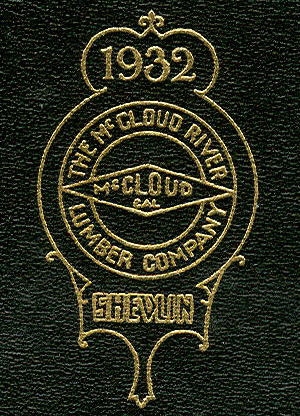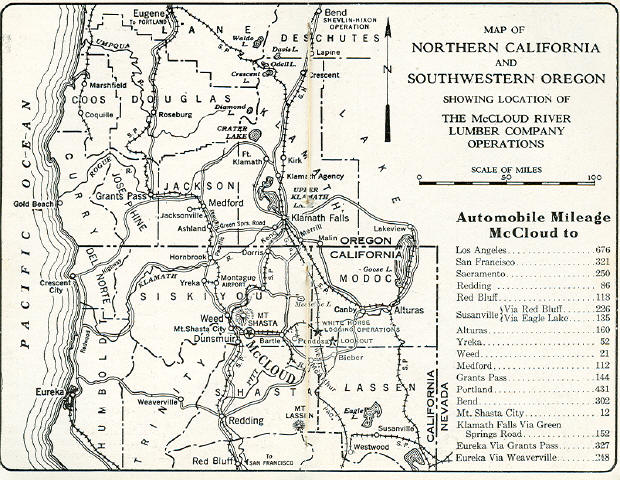|
McCloud Rails: McCloud River Lumber Company
|
|
|
 |
|
McCloud River Lumber Company logo from the cover of a 1932 date book published by the company.
|
|
|
|
The upper reaches of McCloud River were thickly timbered with vast stands of Ponderosa and Sugar pine trees, among other species. A lack of suitable transportation limited the success of most early lumber operators that attempted to establish sawmill operations. The nearest railroad ran in the bottom of the canyon of the Sacramento River, on the other side of a 1,000 foot high spur of Mt. Shasta. In 1892 a man named Friday George established a sawmill in the Squaw Valley. Friday thought he had the transportation problem solved with a steam traction engine, which he used to transport lumber over the mountain to the railhead at Sisson. However, the venture failed in 1894, and the project was abandoned. The McCloud River Lumber Company was brought into existence in March of 1896 by George Scott and William Van Arsdale. The pair owned and ran the Siskiyou Lumber and Mercantile Company, which had sawmill and retail operations around the Mt. Shasta City area, and they were intrigued by the potential of Friday's bankrupt operation. The McCloud River Lumber Company bought out Friday's operation and resumed operations. A small community had established around the old Friday George mill to house the mill employees. One of the first orders of business of the new owners was to expand this community to house the workforce and their families that would be needed to run the operations on the scale envisioned. This new community was initially named Vandale, which was changed to McCloud in 1897/1898. McCloud was a true company town, as everything in the town was owned by the lumber company and provided for the exclusive use of its employees. The initial creators of the McCloud River Lumber Company remained in control until 1902, when they sold out to a group of Minnesota investors headed by a man named Judson Carpenter. The lumber company eventually came under common control with the Shevlin-Hixon Lumber Company, which had a large sawmill operation in Bend, Oregon. The two sawmills, along with Shevlin-Clarke Co. Ltd. of Fort Frances, Ontario, Canada, and Carpenter-Hixon Co., Ltd. of Blind River, Ontario, Canada, were all jointly marketed together under the Shevlin Pine Sales name. |
|
|
 |
|
A map of McCloud River Lumber Company operations as they were in 1932, from a yearbook produced by the company in that year.
|
|
|
|
McCloud served as the center of operations for the McCloud River Lumber Company. Except for the brief existence of the Ash Creek Mill, all commercial sawmilling activities done by the company were handled at the McCloud mill. The original George mill, located on what is today the southeast edge of town, remained in operation until 1919, when a new sawmill was built on the northeast edge of town. This sawmill complex was expanded greatly through the years, eventually becoming one of the biggest sawmills ever to operate in the state of California. Daily production of the mill through most of its history exceeded half a million board feet. At it's height, the McCloud River Lumber Company owned or controlled over 600,000 acres of timberland, almost all of which was located east of town. The company had extensive logging operations that produced the logs needed to keep the sawmill running, along with an extensive railroad system connecting the woods operations with the mill. Some of the railroad system was owned and operated by the McCloud River Railroad Company, but the vast majority of the railroad operation were owned by the lumber company. The lumber company initially used small portable log camps that were used to house the loggers that worked in the woods. These camps were constantly on the move, following the harvest operations as they worked through the woods. However, in 1927 the company transitioned to larger, permanent communities, with the loggers being transported to the cutting sites. The first of these camps to be established, and the longest to remain in operation, was Pondosa. Pondosa was established in 1927 and remained in operation until 1964. In addition to housing the loggers and their families, Pondosa was also home to a large shop building that maintained logging and railroad equipment. The lumber company maintained some other semi-permanent camps as well, including Camp Two (1928-1929, about 23 miles northeast of Pondosa); White Horse (1929-1945, 30 miles northeast of Pondosa); Widow Valley (1946-1947, southeast of White Horse); and Camp Kinyon (1948-1964, 13 miles east of McCloud). The McCloud River Lumber Company had a reputation for being especially good to its employees, which earned it a great deal of respect and loyalty. The company was often referred to as "Mother McCloud" by those that worked for it. "Mother McCloud" lasted up until 1963, when the company was sold to U.S. Plywood Corp. U.S. Plywood Corporation brought many changed to the McCloud scene. The company town era ended, with the entire town quickly sold to the John W. Galbreath Company of Columbus, Ohio. The Galbreath company specialized in the privitization of former company towns. Current residents of each structure in town got the first chance to buy the house they lived in, and a community services district was organized to take over the utilities that the town was dependant on. Other changes brought about by the new ownership was the closure of the last two log camps, Pondosa and Kinyon, with all logging functions consolidated into McCloud. The only log camp that survived the closure of the camps was Pondosa, which was home to a sawmill. U.S. Plywood ownership also saw the end of log hauling by rail. The McCloud sawmill continued in operation under U.S. Plywood and it's successor companies until 1979, when the sawmill was closed. The sawmill did not remain closed for long, however, as a portion of the old plant was purchased and re-opened by P&M Cedar Products within a year. The sawmill later went on to become a Cal Cedar Products operation. The primary purpose of the operation under these later ownerships was the production of cedar pencil stock, used in the manufacture of the classic #2 pencil. However, the drop in use of wooden pencils spelled trouble for the operation, and it closed for the final time in June 2003. Before the sawmill closed, it had been the last remaining sawmill operating in Siskiyou county. The old sawmill site was recently selected as the future site of a Nestle bottled water production facility. The McCloud River Lumber Company had a long and fascinating history. |
|
|
|
Below are a links to pages about the various aspects of the Lumber Company operations.
Lumber Company Railroad Operations
Sawmill Pondosa Shops Also be sure to visit the McCloud, Kinyon, Pondosa, and White Horse pages in the Along the Line section of this website for more pictures of lumber company camps and operations. |
|
|